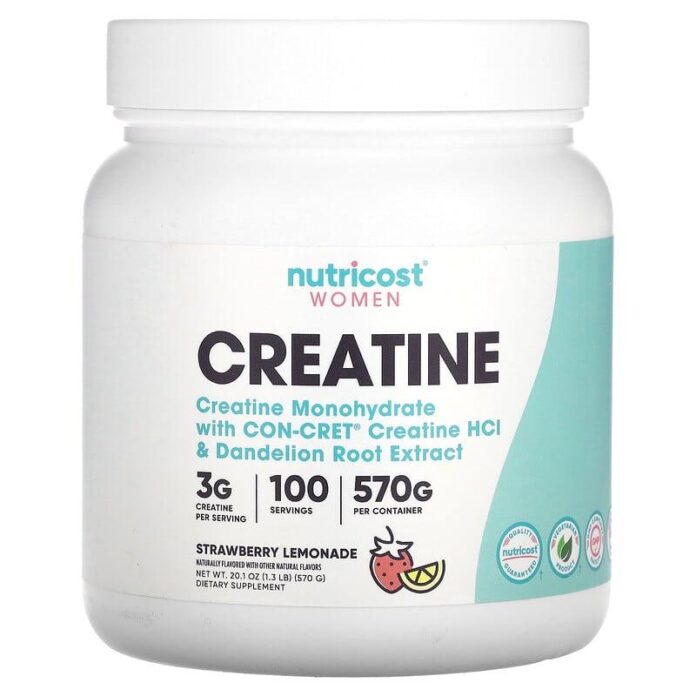In the world of fitness and athletic performance, creatine has long been a staple supplement for enhancing strength, power, and recovery. While traditionally associated with male athletes, an increasing number of women are tapping into the benefits of this popular compound. However, the question remains: do women need a different kind of creatine? With varying physiological needs, training goals, and metabolic responses, it’s essential to consider whether standard formulations are adequate or if tailored options might yield better results. In this article, we’ll explore the nuances of creatine for female athletes, shedding light on the unique demands of women’s bodies and offering our top picks for creatine supplements designed to empower women in their fitness journeys. Whether you’re a seasoned competitor or just starting your athletic path, understanding the right creatine for you can make all the difference in achieving your goals. Join us as we dive into the science, the choices, and the best options available in the realm of creatine for women.

Understanding the Unique Needs of Female Athletes in Supplementation
As the landscape of sports nutrition continues to evolve, understanding the specific supplementation needs of female athletes becomes increasingly crucial. Unlike their male counterparts, women may experience distinct physiological differences that can influence how they absorb and utilize various supplements, including creatine. Factors such as hormone levels, muscle mass, and overall metabolism can affect the way women benefit from creatine supplementation, making it essential for them to tailor their choices based on these unique characteristics. For example, women typically have a higher percentage of body fat and lower muscle mass compared to men, which can alter their creatine requirements and the overall effectiveness of supplementation.
When selecting creatine products, female athletes should prioritize formulas that cater specifically to their needs. Hear are some key considerations:
- Ingredient Transparency: Opt for creatine products with clear labeling that detail the types and amounts of ingredients included.
- Formulation: Choose creatine that is less likely to cause bloating, which can be a concern for women. Micronized creatine or creatine hydrochloride (HCl) are often preferred options.
- Performance Goals: Consider personal athletic goals,whether it’s improving strength,endurance,or recovery,and select a creatine based on how well it aligns with those aims.
Additionally, understanding the potential interactions between creatine and factors such as menstrual cycles can help women optimize their supplementation schedule. Female athletes may also wish to consult with a sports nutritionist to create a tailored supplementation plan that supports peak performance while considering individual health needs.
Exploring the Science Behind Creatine and Its Benefits for Women
Creatine is a naturally occurring compound found in small amounts in certain foods and is synthesized by the body from amino acids. While traditionally associated with male athletes, research increasingly shows that women can also benefit from its use. Creatine plays a vital role in energy production during high-intensity exercise, enhancing performance, strength gains, and recovery. for female athletes, this can translate into improved workout efficacy and faster muscle repair.Notably, women often have lower initial creatine levels, making supplementation particularly beneficial for achieving optimal performance.
The benefits of creatine supplementation extend beyond physical performance. Emerging studies suggest potential cognitive enhancements, such as improved memory and mental clarity, which can be particularly useful for women balancing training with academic or professional responsibilities. Furthermore, creatine may support hormonal balance and muscle health during different life stages, including menstruation and menopause.Key benefits include:
- Increased muscle strength and endurance
- Enhanced recovery post-exercise
- Potential cognitive benefits
- Support for hormonal balance

Top Creatine Options Tailored for Female Performance
When it comes to optimizing performance, female athletes can benefit from creatine just as much as their male counterparts.Yet, the best creatine choices for women take into account unique factors like body composition and energy needs. Here are some remarkable options tailored specifically for enhancing female athletic performance:
- Creatine Monohydrate: The gold standard in creatine supplements, it’s well-researched and supports both strength and endurance.
- Micronized Creatine: This finely ground formula improves absorption and may reduce gastrointestinal discomfort, making it suitable for more sensitive individuals.
- Creatine HCL: Known for its enhanced solubility, this form requires a smaller dose, which can be appealing for those looking to manage intake.
- Creatine Nitrate: Combining creatine with nitrate, this option can help with muscular endurance and may support better blood flow during workouts.
Choosing the right product involves understanding personal goals and preferences. A side-by-side comparison of a few top contenders can aid in decision-making:
| Product | Key Benefits | Best For |
|---|---|---|
| Optimum Nutrition Micronized Creatine | Enhanced Absorption, Zero Additives | General Fitness & Strength Training |
| BulkSupplements Creatine Monohydrate | Pure, Economical Option | Budget-Conscious Athletes |
| Klean Athletes Klean Creatine | Third-Party Tested, Clean Ingredients | Health-Conscious Consumers |
| Gains In Bulk Creatine HCL | Reduced Bloating, Easy Mixing | Sensitive Stomach Issues |

Maximizing Results: Tips for incorporating creatine into Your Training routine
To truly unlock the benefits of creatine, it’s essential to integrate it thoughtfully into your training regimen. Start by scheduling your supplementation around your workouts; taking creatine approximately 30 minutes before exercise can definitely help enhance hydration and increase muscle energy. It’s also beneficial to maintain consistent timing daily, even on non-training days, to ensure that muscle stores are maximized. Aim for a daily intake of about 3-5 grams for optimal results, and don’t forget to combine it with a source of carbohydrates to promote better absorption. Incorporating a pre-workout meal rich in carbs can significantly enhance creatine’s effectiveness in performance enhancement.
When incorporating creatine into your routine, keep an eye on your hydration levels. Dehydration can hinder performance and cause discomfort, so make sure to drink plenty of water throughout the day. Additionally, consider keeping a nutrition journal to track not just your creatine intake, but also your overall training progress. This keeps you aware of how your body responds and allows you to make any necessary adjustments. Here are some tips to optimize your creatine use:
- Loading Phase: if you’re new to creatine, consider a loading phase of 20 grams split throughout the day for the first 5-7 days.
- Stay Consistent: Consistency is key; make it a part of your routine.
- Monitor Your progress: Log any changes in your performance or recovery.
Insights and Conclusions
while the fundamental principles of creatine supplementation remain consistent across genders, the unique considerations and specific needs of female athletes cannot be overlooked. Whether you’re a seasoned competitor or just beginning your fitness journey,choosing the right type of creatine can enhance your performance and support your strengths. We’ve explored the best options available to help you find the perfect fit for your individual goals. As you embark on your path to peak performance, remember that every athlete’s body is different; what works wonders for one may not suit another. So, stay informed, listen to your body, and embrace the power of creatine on your journey to success. Here’s to stronger, healthier, and more empowered strides ahead!



